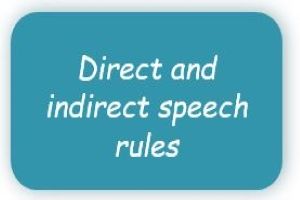Direct and indirect speech rules:
Reported speech, also referred to as direct and indirect speech, is a method of expressing what another person has said without explicitly quoting them. It is especially useful when the speaker is not present or when the original speaker’s words are not known exactly. Reported speech is defined as the act of conveying the exact words that someone else has spoken.
When using reported speech, the speaker must change the verb tense of the original statement to reflect the fact that the words were spoken in the past. For instance, It would be reported as “She said she was going to the supermarket,” if someone said, “I’m going to the supermarket.” Pronouns must be changed to properly reflect the original speaker as well.
So, if the original speaker was a man, the reported speech must use “he.”
The most important part of reported speech definition is that it is not the exact words of the original speaker; rather, it is the speaker’s intention or idea that is conveyed. This means that the reported speech can vary from the original statement and still convey the same idea. The reported statement might read, “She said she was going to the store,” for instance, if the original speaker said, “I’m going to the store.”
Reported speech rules:
- Change the pronoun: I -> he/she, we -> they, me -> him/her
- Reported speech should be written in the third person (the king said, ” He would give a reward the next day”).
- Change the time: now -> then, today -> that day, tomorrow -> the next day/the following day
- Change the place: here -> there, this -> that
- Be careful with the verb tenses:
- Reported speech should be written in the past tense ( The king said, ” he would give a reward the next day”).
- If the speaker asks a question that can only be answered with yes or no add If or weather.
The King said, “Do you want to enjoy your life?”
The King asked if he enjoyed he wanted to enjoy his life.
- Do not change the dialogue in the past tense when the dialogue is about Universal truth (The King said, ” The earth is round”.
– if the original sentence is in the present tense, you don’t need to change the tense in the reported speech
– if the original sentence is in the past tense, you need to change the tense to the past perfect in reported speech
– if the original sentence is in the future tense, you need to change the tense to the conditional in reported speech
In everyday life, direct speech can also be used to great effect. For example, For instance, you can use their precise words to correct someone when they say something in a meeting that you know to be untrue.
.This may be an effective method to make sure that the truth is told and that people are held accountable.

